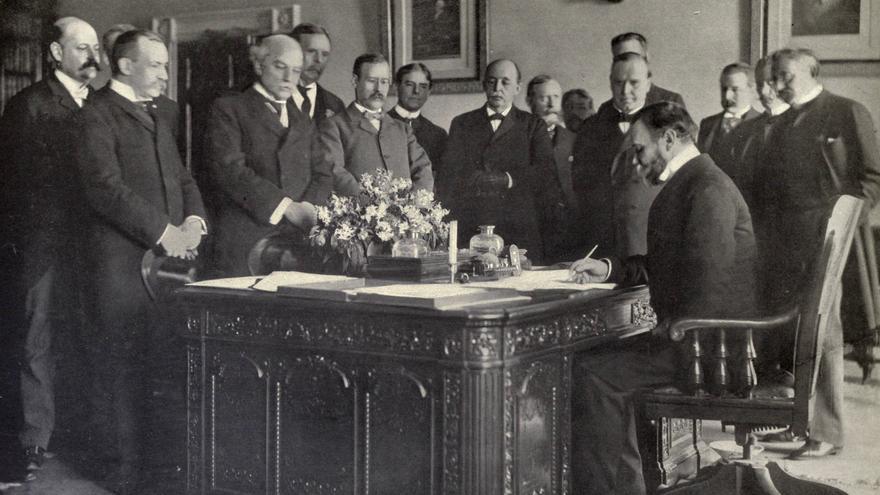
![]() 14ymedio, Yunior García Aguilera, Madrid, December 6, 2023 — When Spain and the United States signed the Treaty of Paris, Cuba’s future was uncertain. The Americans had made it clear that they were not interested in annexation but there was no clear path to sovereignty either. The island’s fields had been torched by war, small landowners had no animals to plow them, and the railway infrastructure lay in ruins. What then did it mean for the majority of those we call “the public” or that other thing we call “freedom”?
14ymedio, Yunior García Aguilera, Madrid, December 6, 2023 — When Spain and the United States signed the Treaty of Paris, Cuba’s future was uncertain. The Americans had made it clear that they were not interested in annexation but there was no clear path to sovereignty either. The island’s fields had been torched by war, small landowners had no animals to plow them, and the railway infrastructure lay in ruins. What then did it mean for the majority of those we call “the public” or that other thing we call “freedom”?
The rebels’ machetes and bullets killed just over 3,000 Spaniards while various diseases claimed more than 40,000 lives. Some 80,000 Cubans fought on the Spanish side, either as volunteers or replacement troops. The Army of Liberation, however, never amounted to even half that number. Worst of all, most of its soldiers did not join the struggle until its final month, after the United States had already intervened in the conflict and it was clear that Spain would lose control of Cuba.
Jumping aboard the victory bandwagon has always been easy. At that point in the war, everyone on the island could sing “La Bayamesa”. On more than one occasion, the rebel commander Máximo Gómez became frustrated with the widespread public indifference to the conflict. At the end of the Ten Years’ War, as he was preparing to go into exile, a crowd gathered at the port of Santiago de Cuba. Gómez would later write in his diary, “I gaze out with great sorrow at a throng of more than 8,000 young Cubans who did not have the courage to take up arms to liberate their country.” It is understandable that he would choose not attend the ceremony transfering power from the panchos to the gringos on January 1, 1899. For him, peace often had a bitter taste.
Many Spanish officials remained in their posts. Today, some Twitter users would be scandalized and call this a fake change
Initially, the provisional government retained the same administrative system as well as the civil and criminal codes. Many Spanish officials even held onto their positions. Today, some Twitter users would be scandalized by this and call it a fake change. But the truth is that, as the Americans saw it, not everyone who could wield a machete was ready for a desk job. Their priority was to get a shattered economy back on track and maintain as much stability as possible.
Naturally, the radical nationalists were furious. They had not shed their blood in the mountains only to end up being ordered around by someone with a Castilian accent. America’s Secretary of War at the time, Elihu Root, admitted to leading a stressful life, afraid of finding out that his troops had been forced to shoot the former Cuban insurgents.
It became necessary to integrate the war veterans into the new government. Among those chosen were men with illustrious names. Men who had been trained in the United States or Europe, who had patriotic credentials and their own fortunes and thus would not be tempted to use the public purse to enrich themselves. It could be said that they were a thousand times more competent than the current Cuban government, staffed as it is with useless cadres trained in demagoguery and double-talk. However, history was not be kind to those first Cuban officials. They have been mostly ignored or branded with broad labels that did not take into account the historical context.
The same thing will probably happen to those brave enough to take on administrative responsibilities when the time comes for Cuba to transition to a free society. Accepting government postions at that point will involve making more complex, controversial and perhaps thankless decisions. It will be like setting oneself on fire. Quite possibly none of those who decide to participate in this process will be go on to play a role in the future democracy.
And while all this is going on, what role will the broader public play in the transition? It is likely that crowds will take to the streets in euphoria. One can assume that many will attack the symbols of Castroism as happened after the fall of Machado and Batista. We can even imagine Patria y Vida being sung on the major boulevards at full volume. But then most will go back to hiding behind their cell phone screens, onlookers to the change.
Most of us are on airplane mode, waiting for someone to bring out the body as we scroll past the inanities of some government minister, reports on the Cuban first lady’s latest international first-class jaunt with her son — the unofficial bodyguard— and the viral videos of Yarelis and her boyfriends.
What we call the public is often an abstraction, a dream from which we awaken from time to time if something, or someone, shakes the bed forcefully enough.
____________
COLLABORATE WITH OUR WORK: The 14ymedio team is committed to practicing serious journalism that reflects Cuba’s reality in all its depth. Thank you for joining us on this long journey. We invite you to continue supporting us by becoming a member of 14ymedio now. Together we can continue transforming journalism in Cuba.
